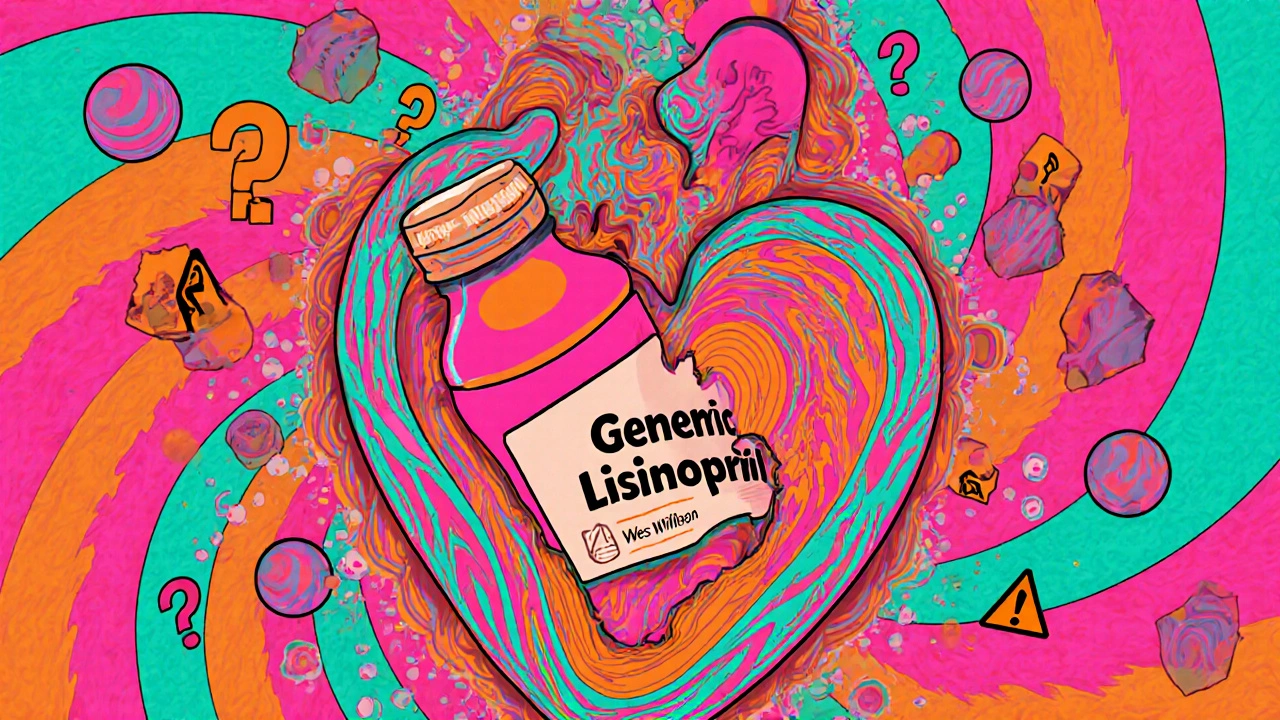
When your doctor switches your brand-name blood pressure pill to a generic version, you might feel uneasy. Is it really the same? Will it work just as well? Or could it put you at risk? These aren’t just patient worries-they’re backed by real data, studies, and even regulatory red flags.
What Exactly Are Cardiovascular Generics?
Cardiovascular generics are exact chemical copies of brand-name heart medications like lisinopril, metoprolol, atorvastatin, and losartan. They must contain the same active ingredient, dose, and way of delivery-whether it’s a pill, capsule, or tablet. The U.S. Food and Drug Administration (FDA) requires them to be bioequivalent, meaning they’re absorbed into your bloodstream at nearly the same rate and amount as the original. The acceptable range? Within 80% to 125% of the brand-name drug’s levels. That’s not a guess-it’s a strict lab standard tested in healthy volunteers before approval. By 2023, generics made up 90% of all prescriptions filled in the U.S., and nearly one in five of those savings came from heart drugs. That’s billions of dollars saved yearly. But savings don’t always mean safety. And that’s where things get complicated.The Evidence: Do Generics Work as Well?
The best evidence comes from randomized controlled trials-the gold standard in medicine. A 2020 Harvard Health meta-analysis looked at 38 of these high-quality studies involving heart medications. In 35 of them (92.1%), there was no meaningful difference in outcomes between generics and brand-name drugs. Patients had the same blood pressure control, same cholesterol drops, same rates of heart attack or stroke. But two other major studies tell a different story. One, published in Circulation: Cardiovascular Quality and Outcomes, tracked over 136,000 seniors in Quebec after generic versions of ARBs (like losartan and valsartan) hit the market. In the first month after switching, adverse events-like dizziness, kidney issues, or hospital visits-jumped from 10% to 14% for some generics. Another 2023 meta-analysis found that while most generic cardiovascular drugs performed equally, generic statins were linked to a 13% higher risk of major heart events compared to brand-name versions. Why the mismatch? It’s not about the active ingredient. It’s about what’s inside the pill besides the medicine.The Hidden Difference: Inactive Ingredients Matter
Generics don’t have to match the brand-name drug’s fillers, dyes, or coatings. These inactive ingredients help the pill dissolve, hold its shape, or prevent it from sticking. For most people, it doesn’t matter. But for some, especially older adults or those with sensitive digestion, a change in coating can alter how quickly the drug is absorbed. A 2019 JAMA Internal Medicine study found that when patients switched to a generic version with a different pill color or shape, 14.2% stopped taking it altogether. Why? They thought it wasn’t the same. Or worse-they felt different. That’s not just psychology. If a pill dissolves slower, your blood levels of the drug dip. For drugs like warfarin or certain beta-blockers, even small changes can mean trouble. And it’s not just perception. A 2020 study in Quebec showed that patients newly switched to generic ARBs had higher rates of hospital visits for heart failure or kidney problems. The researchers didn’t blame the drug itself-they blamed the sudden change in formulation.The Quality Control Problem
In 2018, a global scandal rocked the generic drug industry. Contaminated valsartan, losartan, and irbesartan pills were found to contain cancer-causing nitrosamine impurities. Over 1,200 recalls followed. The FDA didn’t catch them all. Manufacturers in India and China, where most generics are made, were using outdated processes. The FDA’s 2022 inspection report found that 12.7% of generic drug plants had critical quality violations. Even today, the FDA tests hundreds of generic heart drug lots each quarter. In early 2024, nearly 15% of those tested exceeded safe limits for nitrosamines. That’s not a one-time glitch. It’s an ongoing risk.Who’s Saying What?
Doctors aren’t united on this. A 2021 American Medical Association survey found that 34.7% of cardiologists had patients ask them if generics were safe-many of those patients refused to take them. Meanwhile, 25% of physicians said they wouldn’t use generics for their own families. But here’s the contradiction: pharmacists, who handle these drugs daily, are far more confident. Nearly 90% of community pharmacists believe generics are just as safe and effective. And they’re the ones who spend hours explaining the switch to worried patients. Dr. Paul Poirier, a leading researcher on this topic, put it simply: “The problem isn’t the drug. It’s the switch.” He believes the body needs time to adjust to even tiny differences in how the medicine is delivered.Who Should Be Careful?
Not everyone needs to avoid generics. But some groups should proceed with caution:- Patients on warfarin or other narrow-therapeutic-index drugs-small changes can cause bleeding or clots.
- Older adults with kidney or liver issues-slower metabolism makes them more sensitive to absorption changes.
- People who’ve had bad reactions after switching before.
- Those taking multiple heart meds-each switch adds complexity.
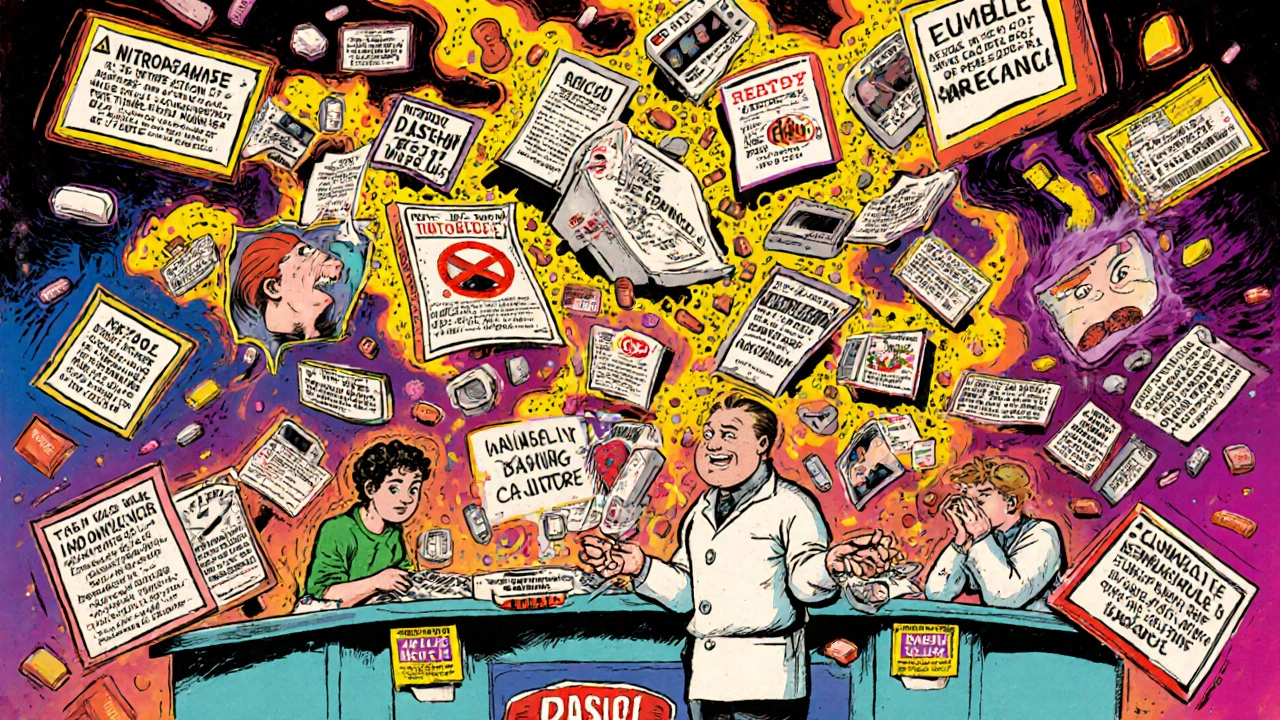
What You Can Do
You don’t have to guess. Here’s what works:- Ask for the same generic each time. If your pill looks different, ask why. A change in manufacturer could mean a new formulation.
- Track how you feel. Keep a simple log: energy, dizziness, swelling, chest tightness. Bring it to your next appointment.
- Don’t stop cold. If you’re worried, talk to your pharmacist. They can help you switch slowly or stick with a brand you trust.
- Use medication therapy management. Many pharmacies offer free counseling for patients on multiple heart drugs. Studies show this cuts discontinuation rates by over 20%.
The Bottom Line
Cardiovascular generics aren’t inherently dangerous. Most of them work just as well as the brand names. But they’re not always identical. And for some people, even small differences can have big consequences. The data says: for the majority, generics are safe. But the real-world evidence also shows that switching without monitoring can increase risk-especially for older adults and those on complex regimens. Don’t let cost be the only factor. If you’re concerned, ask questions. If you feel different after a switch, speak up. Your heart deserves both affordability and safety.Are generic heart medications as safe as brand-name ones?
For most people, yes. Large studies show that 90%+ of the time, generic cardiovascular drugs work just as well as brand-name versions. But exceptions exist. Some studies found higher rates of hospital visits or heart events after switching to certain generics-especially statins and ARBs. The differences aren’t due to the active drug, but to changes in inactive ingredients or manufacturing quality.
Why do some patients feel worse after switching to a generic?
It’s often not the medicine itself-it’s the change. Generics can have different fillers, coatings, or colors. These can affect how quickly the drug is absorbed. For people with sensitive systems-like older adults or those with kidney disease-even small changes in blood levels can cause dizziness, fatigue, or worsening symptoms. The body needs time to adjust, and sudden switches without monitoring can trigger problems.
Which cardiovascular generics should I be cautious about?
Be extra careful with drugs that have a narrow therapeutic index-where small changes in dose can cause harm. These include warfarin, certain beta-blockers, and some anti-seizure meds used for heart rhythm. Also, watch out for generic ARBs (like losartan and valsartan) and statins. Studies show slightly higher risks of adverse events after switching to these generics, especially in seniors.
Can generic heart meds be contaminated?
Yes. Between 2018 and 2020, over 1,200 recalls happened because of cancer-causing nitrosamine impurities in generic ARBs. The FDA still tests hundreds of generic heart drug lots each quarter. In early 2024, nearly 15% of tested lots exceeded safe limits. While most are safe, contamination risks remain, especially with manufacturers outside the U.S. and EU.
Should I refuse a generic if my doctor offers it?
Not necessarily. For most people, generics are safe and save money. But if you’ve had a bad reaction before, or if you’re on a complex heart regimen, say so. Ask if there’s a reason for the switch. You can often request a specific generic manufacturer or stick with the brand if your insurance allows. Your health matters more than cost savings-if you feel worse, speak up.
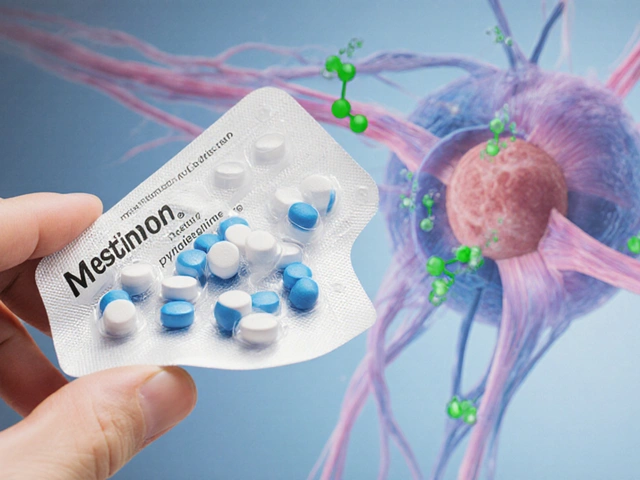
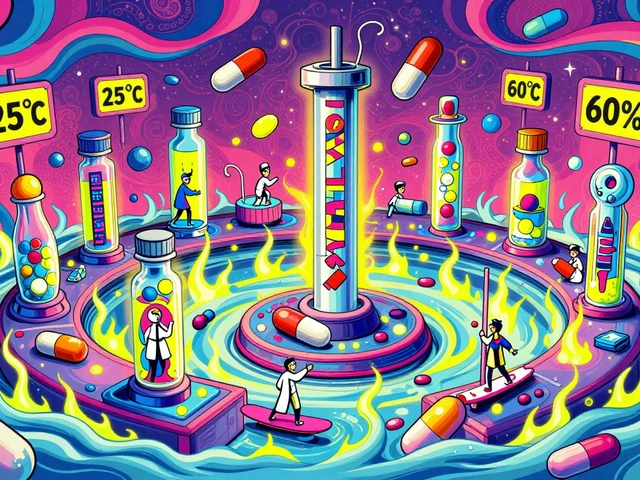

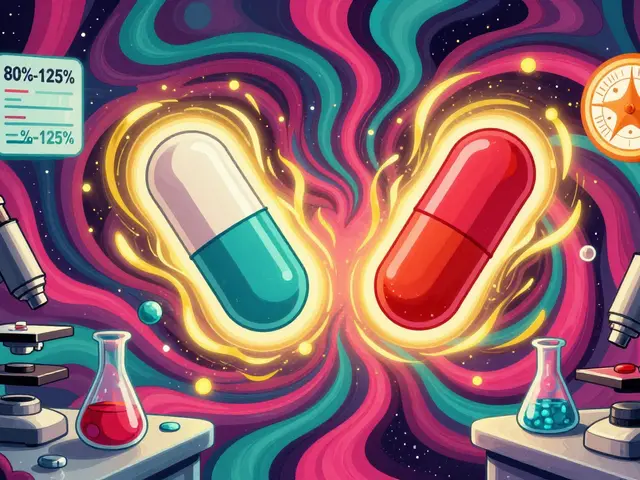
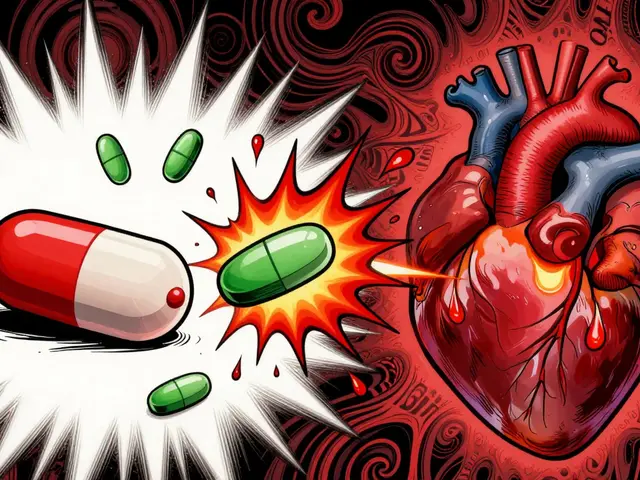

james lucas
November 22, 2025 AT 17:57man i switched to a generic lisinopril last year and thought i was gonna die for a week-dizzy as hell, felt like my brain was swimming in molasses. turned out it was a different filler, switched back to the old batch and boom, normal again. my pharmacist said it happens more than you think, especially with older folks. just because it’s chemically ‘the same’ doesn’t mean your body agrees. i’m not anti-generic, but i’m pro-paying attention.
also, why do they change the color every time? it’s like getting a new phone and thinking it’s broken because the logo moved.
Jessica Correa
November 23, 2025 AT 06:24i used to be super skeptical about generics until my dad got on them after his stent and saved like 80% on his meds. he’s 72, has kidney issues, and we watched him like a hawk. no problems. but i get why people freak out-when you’re on 5 heart meds already, changing one pill feels like playing russian roulette. maybe the system needs better tracking, like barcode scans on prescriptions so you know if the manufacturer changed.
also, the color thing is wild. my mom refused to take her generic metoprolol because it was blue instead of white. she swore it was ‘weaker.’ turns out it was just a different coating. she’s fine now but man, psychology is real.
Melvina Zelee
November 24, 2025 AT 06:03you know what’s wild? we treat generics like they’re just cheap knockoffs, but we don’t do that with anything else. if you buy a generic battery, you don’t worry it’ll explode your phone. if you buy generic detergent, you don’t assume it’ll ruin your clothes. but medicine? suddenly we’re all paranoid biochemists. why?
it’s because we’re scared. we’re scared of dying. we’re scared of being lied to by the system. and yeah, sometimes the system *has* lied-nitrosamines, bad manufacturing, lack of oversight. but that’s not the fault of generics. it’s the fault of deregulation and outsourcing without accountability.
the real issue isn’t whether the drug works-it’s whether we trust the people making it. and honestly? we shouldn’t. not until they’re forced to test in real patients, not just healthy volunteers. we need post-market surveillance that’s actually active, not just a checkbox.
also, i’m tired of doctors acting like it’s their decision to switch. it’s not. it’s the pharmacy benefit manager’s. patients deserve to know who’s really pulling the strings.
steve o'connor
November 24, 2025 AT 17:50in ireland we’ve been on generics for decades and it’s fine. no mass hospitalizations, no epidemics of dizziness. sure, there’s the occasional weird reaction, but that’s true of *any* drug, brand or not. i think the us makes this way more dramatic than it needs to be. maybe it’s the litigation culture? everyone’s looking for someone to sue when they feel off.
also, the whole ‘different color = different drug’ thing? that’s just a marketing myth. my gran takes three generics and she calls them by their shape, not the color. ‘the oval one’ ‘the blue round one’-she’s fine. maybe we need to educate people better instead of scaring them.
ann smith
November 26, 2025 AT 01:14thank you for writing this with such care and clarity. 💙
as someone who manages medications for elderly relatives, i’ve seen firsthand how a simple switch can trigger anxiety, fatigue, or even falls. it’s not ‘all in their head.’ it’s physiology + psychology + poor communication.
please, if you’re a provider-don’t just swap. explain. document. follow up. and if a patient says ‘i don’t feel right,’ believe them. their body knows before their lab results do.
you’ve given us the tools to speak up. thank you for that.
Julie Pulvino
November 27, 2025 AT 04:09i switched to a generic atorvastatin last year and honestly? felt nothing. no dizziness, no weird fatigue. my cholesterol dropped the same. i’m 45, healthy, no other meds. maybe it’s because i’m young? or maybe i just got lucky with the manufacturer?
but my aunt? she’s 78, on warfarin and lisinopril, and she refused to switch. she said ‘if it ain’t broke, don’t fix it.’ and honestly? i get it. if you’re stable, why risk it?
maybe the rule should be: don’t switch unless you have to. not the other way around.
Patrick Marsh
November 27, 2025 AT 05:30Stop.
Listen.
Don't switch without asking.
Track your symptoms.
Call your pharmacist.
It's that simple.
Robin Johnson
November 29, 2025 AT 02:22you’re not wrong about the inactive ingredients-but here’s the real issue: nobody’s tracking which generic you got. no database. no barcode. no record. so when you get a bad batch or a different formulation, your doctor has no idea. you’re just left guessing.
we need a universal pill ID system. like a QR code on the bottle that links to the manufacturer, lot number, and excipient list. then you could scan it and see if your last refill was from the same company. if not, you can flag it before you take it.
also-why is the FDA letting companies change formulations without retesting in vulnerable populations? that’s not science. that’s cost-cutting with lives on the line.
you want safety? make transparency mandatory. not optional.
Latonya Elarms-Radford
November 29, 2025 AT 06:04oh honey. let me tell you about the dark side of Big Pharma’s ‘generic’ empire. it’s not just about fillers or coatings-it’s about the soul of medicine being sold in bulk. do you know where most of these pills are made? in factories where workers breathe chemical dust for $2 a day? where inspectors come once a year and are shown the cleanest corner of the plant? where nitrosamines are not ‘accidents’-they’re *economies*?
we’ve turned healing into a commodity. We’ve normalized the idea that your life-saving drug can be manufactured in a facility that barely meets minimum standards, just because your insurance won’t cover the brand name.
and then we blame the *patient* for feeling ‘weird’ after the switch? we blame them for not being ‘educated enough’? no. we blame the system that turned medicine into a profit margin.
if you want to save money? fix the healthcare system. Don’t make sick people gamble with their hearts because a corporation decided to cut corners.
your heart isn’t a cost center. it’s sacred. and right now, it’s being auctioned off to the lowest bidder.
Mark Williams
December 1, 2025 AT 03:26the bioequivalence window of 80–125% is statistically valid in controlled trials, but it’s a population-level metric. individual pharmacokinetics vary wildly-especially in elderly patients with polypharmacy, hepatic impairment, or altered gastric motility. the Cmax and AUC thresholds don’t account for intra-individual variability over time, particularly with drugs exhibiting non-linear absorption kinetics like warfarin or phenytoin.
furthermore, the FDA’s reliance on healthy volunteers for bioequivalence studies is methodologically flawed for chronic cardiovascular populations. we need real-world pharmacovigilance data from high-risk cohorts, not just lab models.
the statin data is particularly concerning: 13% increased MACE risk suggests either suboptimal dissolution kinetics or inconsistent plasma concentration profiles in vulnerable subgroups. this isn’t ‘perception’-it’s pharmacodynamic drift.
we need tiered bioequivalence thresholds based on therapeutic index and patient risk stratification. not a one-size-fits-all 80–125% band.
Daniel Jean-Baptiste
December 1, 2025 AT 16:36in canada we have generics too and honestly most people don’t even know what brand they’re on. my uncle takes his blood pressure med and just says ‘the blue pill’ and it works. he’s 80 and fine. i think the problem is we overthink it in the us. also, the color thing is ridiculous. my cousin refused to take her generic because it was orange instead of white. she thought it was poison. it was just a different dye. maybe we need to teach people that pills aren’t magic, they’re chemistry.
also, i think the real issue is access to pharmacists. if you have someone who can explain the switch, you’re way less likely to panic. but if you’re just handed a new bottle and told ‘it’s the same,’ yeah, you’re gonna freak out.
Ravi Kumar Gupta
December 2, 2025 AT 06:41in india we have generics so cheap you can buy them from roadside stalls. my cousin took a generic blood thinner and had a stroke. they said it was ‘bad batch.’ but guess what? no one was held accountable. no one even checked. the government just said ‘it’s fine.’
so when i see americans arguing about 13% higher risk? i laugh. you think that’s bad? try having your grandma die because the generic she bought for $0.10 had no active ingredient at all. we’ve seen it. we’ve buried it.
your system at least has inspections. we have none. so don’t act like you’re the only ones with problems. you’re lucky you even have a FDA.
but still-yes, switching without warning is dangerous. i agree. your body remembers the pill it grew used to. don’t mess with it unless you have to.
Rahul Kanakarajan
December 3, 2025 AT 18:09you’re all overthinking this. if you can’t tell the difference between a brand-name and a generic, you probably shouldn’t be on heart meds at all. this isn’t wine tasting. it’s medicine. if you’re feeling weird, maybe you’re not taking it right. maybe you’re drinking grapefruit juice. maybe you’re not sleeping. maybe you’re stressed. stop blaming the pill.
and for god’s sake, stop treating your medication like a sacred object. it’s a chemical compound. it’s not your soul. get over it.
also, if you’re rich enough to afford brand-name drugs, good for you. but don’t act like you’re morally superior because you’re spending $300 a month instead of $10. the rest of us have to live too.
New Yorkers
December 4, 2025 AT 17:26oh please. you think this is new? we’ve been getting ripped off by Big Pharma since the 70s. generics? they’re just the latest lie wrapped in a white pill. you think the FDA cares? they’re on the payroll. the whole system is rigged. you think your ‘safe’ generic isn’t made in a factory where they flush the waste into the Ganges? please. you’re drinking that water too.
and don’t tell me ‘most people are fine.’ I know people. I know what happens when you swap a pill. People die. Quietly. In their sleep. While the insurance company saves $12 a month.
you want safety? Get rid of the profit motive. Until then, you’re all just playing Russian roulette with your arteries.
David Cunningham
December 5, 2025 AT 12:12australia’s been doing generics for ages and it’s mostly fine. we have a national database that tracks which batch you got, and if there’s a recall, they text you. no drama. no panic. just a simple ‘your pill changed, here’s why.’
also, our pharmacists actually talk to patients. not just hand over the bottle and say ‘take two.’ they ask how you’re feeling. they check in. maybe that’s the secret sauce? not the pill. the person behind the counter.
we don’t treat medicine like a religious artifact here. we treat it like a tool. and tools can be replaced-if you’re told why.
Jessica Correa
December 6, 2025 AT 22:35just read james’ comment about the dizziness-i had the exact same thing with my generic metoprolol. switched back to the original manufacturer and felt like a new person. i didn’t know you could even track which manufacturer made your generic. i thought they were all the same. turns out you can ask for a specific one. my pharmacist said ‘most people don’t know that.’
so if you’re feeling off after a switch-don’t just tough it out. ask for the same maker. it’s not ‘special treatment.’ it’s smart medicine.
ann smith
December 7, 2025 AT 01:49thank you for sharing this, Jessica. 💙
that’s exactly what I’ve been telling my patients: ‘Don’t accept the switch silently. Ask: ‘Is this the same manufacturer as last time?’’
Many don’t realize they have that power. You just gave someone the words to speak up.
That’s the kind of community knowledge that saves lives.